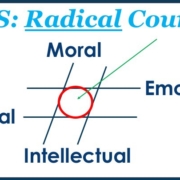3 Ways to Use The Lasso Effect to Improve your Leadership
Ted Lasso leadership isn’t possible in real life.
Ted Lasso is a person of reflexive positivity who remains blissfully ignorant of the job and yet wins everyone over while consistently losing games.
Ted Lasso is not a mentor, he’s a mirror, showing us our own absurdity.
WHY IT MATTERS: When we see what’s wrong, we can fix it.
Mirror Image #1: Be confident in your ignorance of other people’s motives.
Team owner, Rebecca, hired Ted to coach an English Premier League football team (Americans call the sport soccer) after Ted’s American college football team won a national championship.
She wanted the team to become a laughingstock to get back at her philandering ex-husband.
Any sane person would have walked off the job after being sabotaged repeatedly.
Ted did the unexpected, emotionally connecting with Rebecca in daily “biscuits with the boss,” treating her with kindness despite her frostiness (which she used to hide deep hurt), and respecting her professionally.
You never know what someone is going through, so give them a break. Who knows, maybe they’ll become your biggest champion and strongest ally.
Mirror Image #2: Don’t take the bait; Take the high road.
Today’s polarization revolves around a need to show moral superiority over anyone who disagrees with you.
After Ted helped the team’s equipment assistant, Nate Shelley, discover his game-strategy genius, the latter stabbed his coach in the back and took a head-coaching job at a rival team (hired by Rebecca’s ex-husband).
Nate’s team won consistently, even as he took cheap shots at Ted, who only treated Nate with respect.
A security camera caught Nate sneaking into the team’s locker room to tear up Ted’s “Believe” sign. When the two teams met on the pitch, Ted’s assistants decided to show the video to the team at half-time to boost their motivation, even after Ted warned them not to do so.
The video unhinged the team, who wanted revenge and played even more poorly in the second half.
Nate’s deep insecurity motivates him to insult Ted; Ted rolls with the punches and deflects the disparagement with self-effacing humor.
The need to show your moral superiority is a sign of insecurity and a fast track to getting nothing noteworthy done because you alienate the other side.
Keep calm and find common ground. It’s hard to roll up your sleeves while wringing your hands.
Mirror Image #3: You cannot show courage when there’s no danger.
Ted engages with people who disagree with him. He talks with irate, insult-hurling fans, welcomes a reporter known for hatchet jobs to do an exclusive on the team, handles prima-donna players by letting them wear themselves out, and never shifts blame.
He’s willing to put himself in emotional, professional, and moral danger to do the right thing.
Courage, Aristotle said, is the virtue that allows the others to exist. You must be in the arena, doing your best even when the outcome is in doubt, and be willing to take off the body armor and grow.
Twitter mobs and demagogues are the opposite of courage because they are playing to the crowd, safely ensconced in their own bubbles.
Pop your bubble; step away from your silo; get out of your comfort zone. You make more progress building bridges than building walls.
I loved the final episode when Ted asked Trent to change the name of the book title about the team, “It wasn’t about me, it never was.”
Who’s your mirror? Gaining new perspectives is one of the greatest values of using coaches and advisers.
Are you ready to see how a trusted advisor can help you achieve your goals? Schedule a call with Chris here.











